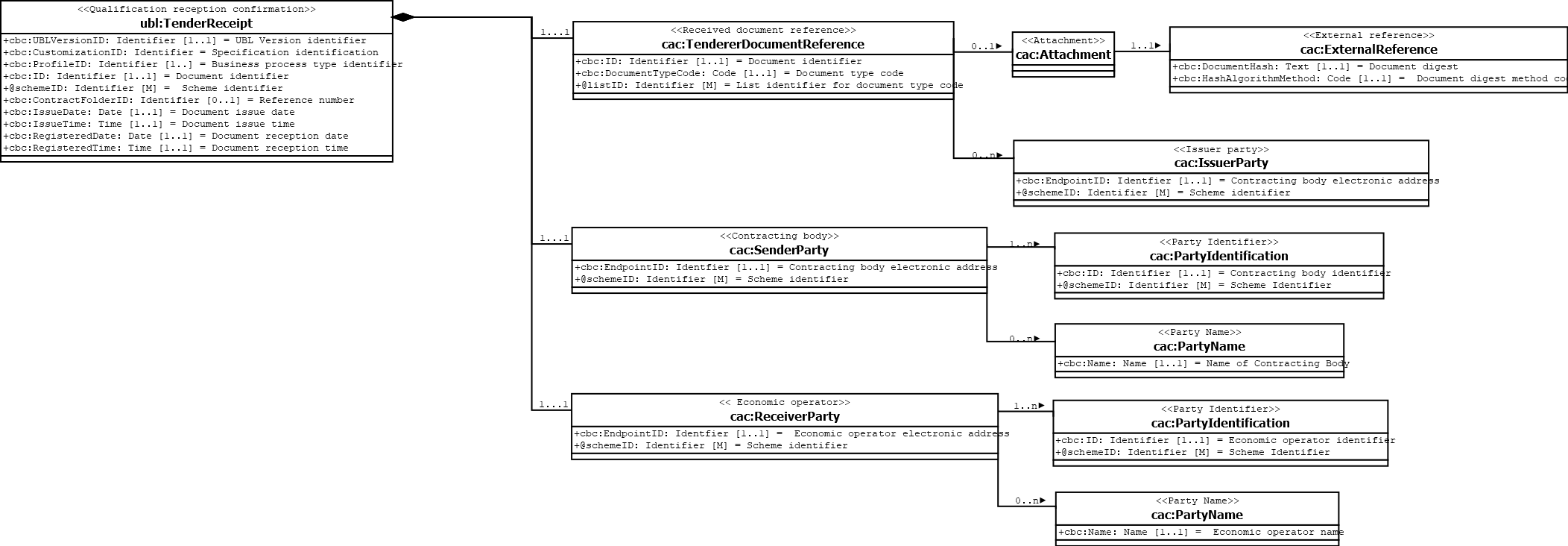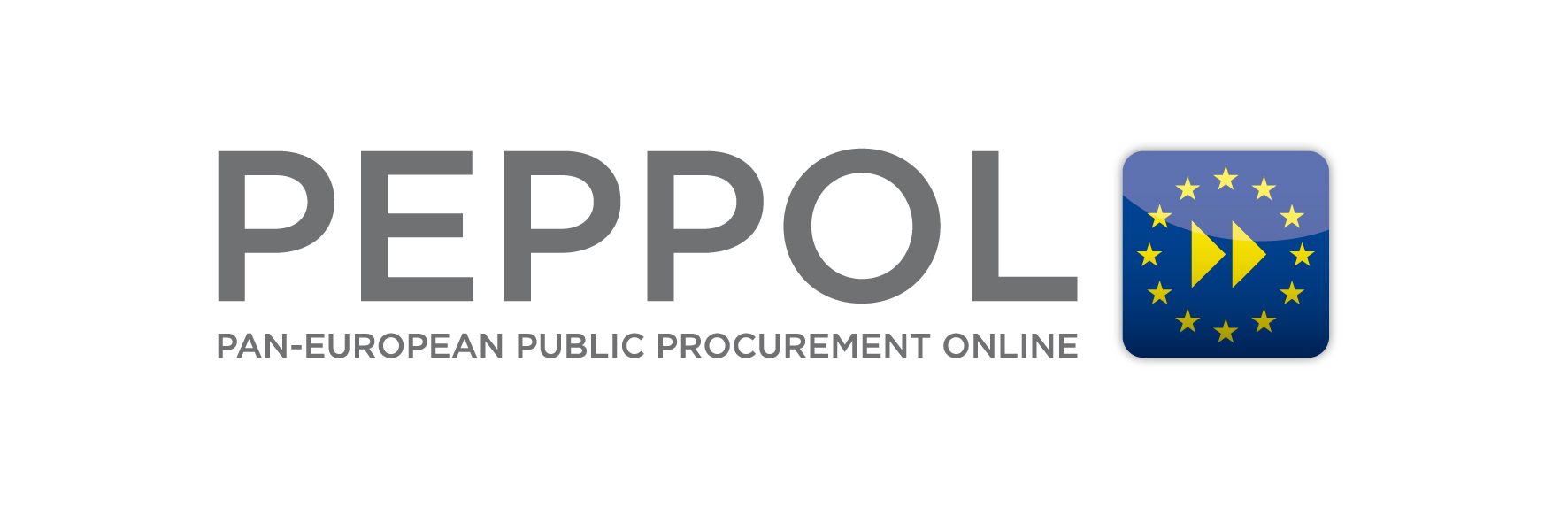The PEPPOL Business Interoperability Specification, “BIS” from here on after, has been developed by the OpenPEPPOL AISBL Pre Award Coordinating Community and is published as part of the PEPPOL specifications.
1. Principle and prerequisites
1.1. Scope
This guide aims to provide insight into transaction details for the transaction model T020 - Qualification Reception Confirmation 1.1. The transaction description is meant to be a standalone description to be used as a part of one or more procurement profiles. It describes syntax mappings, requirements, rules and example.
The transactions, specified in this document are intended to be exchanged between the tendering systems of economic operators and contracting bodies. This means that it is expected that the parties have connected their systems to the internet, and that they have middleware in place to enable them to send and receive the transactions in a secure way, using an agreed syntax.
The content model of the transactions can also be used in procurement platforms or notification platforms, so that these platforms as well as procurement systems of economic operators and contracting bodies are based on the same information and process models, which makes them more interoperable. Even if platforms are not technically interoperable, the content model facilitates understanding the tendering documents and to participate in the tendering process.
1.2. Parties and roles
The following parties participate as business partners in this transaction, acting in the roles as defined below
| Party | Description | Example of roles |
|---|---|---|
Customer |
The customer is the legal person or organization who is in demand of a product, service or works. |
Buyer, consignee, debtor, contracting body |
Supplier |
The supplier is the legal person or organization who provides a product, service or works. |
Seller, consignor, creditor, economic operator |
| Role | Description |
|---|---|
Contracting body |
The contracting authority or contracting entity who is buying supplies, services or tendering works. |
Economic operator |
Party participating with a bid in a procurement process to sell goods, services or works. |
2. Transaction business and information requirements
The PEPPOL transaction "T020 - Qualification Reception Confirmation 1.1" is a structured electronic business document for confirming the reception of a qualification. By submitting a qualification reception confirmation the contracting authority confirms that he has received a qualification. The qualification reception confirmation does not imply that the qualification is valid or complete.
The transaction "T020 - Qualification Reception Confirmation 1.1" inherits from the CEN WS/BII 3 profile
The following table describe the transaction business and information requirements of "T020 - Qualification Reception Confirmation 1.1".
| ID | Requirement |
|---|---|
tbr42-001 |
The Qualification Reception Confirmation shall have its own ID, date and time (and timezone) of issue and name or identification of its sender and receiver. |
tbr42-005 |
The Qualification Reception Confirmation shall refer to the Tender documents that were received and to the procurement project. |
tbr42-002 |
The Qualification Reception Confirmation shall state the date and time the Qualification was received |
tbr42-003 |
The Qualification Reception Confirmation shall NOT give an assessment on completeness or validity of the Qualification. |
tbr42-006 |
In case the Qualification document was submitted simultaneously with the Tender documents and/or the pre-award Catalogue document, the Qualification Reception Confirmation shall not be sent. |
tbr42-007 |
It shall be possible to check the integrity of the received document(s), e.g. by quoting the hash values. |
tbr42-008 |
It shall be possible to check the integrity of the Qualification Reception Confirmation |
3. Data model: Syntax mapping and XML example
3.1. Data model and syntax mapping
The data model and syntax mapping for Qualification Reception Confirmation can be found at Syntax mapping for T020 - Qualification Reception Confirmation 1.1. The data model and syntax mapping explains how to use the UBL (or an underlying syntax) to support the Qualification Reception Confirmation information transaction requirements. It provides the syntax mappings from each UBL (or syntax) element to the Qualification Reception Confirmation information elements of this transaction.
3.2. Data model diagram
The following transaction data model illustrates the classes and information elements of T020 - Qualification Reception Confirmation 1.1.

4. Code lists
Any element with the semantic data type = code, can mandate the use of a specific code list (or a fixed value). The applicable code lists can be found in the Code list section. In this section, you can find the valid codes, their names and description, and also links to where the same code list is used elsewhere in the transaction, or in other PEPPOL BIS transactions.
| Information elements that are ruled by codelists in this transaction are also described in the Syntax mapping for Qualification Reception Confirmation: Syntax mapping for T020 - Qualification Reception Confirmation 1.1 |
The following code lists for coded elements and identifier schemes are used by the transaction.
4.1. Code list for elements
4.2. Code list for identifier schemes
| Business Term | Allowed Scheme | Applicable Xpath |
|---|---|---|
Economic operator electronic address identifier |
schemeID attribute is mandatory and must use values from EAS codes |
cac:ReceiverParty/cbc:EndpointID/@schemeID |
Contracting body electronic address identifier |
schemeID attribute is mandatory and must use values from EAS codes |
cac:SenderParty/cbc:EndpointID/@schemeID |
Economic operator identifier |
schemeID attribute is mandatory and must use values from ICD codes |
cac:ReceiverParty/cac:PartyIdentification/cbc:ID/@schemeID |
Contracting body identifier |
schemeID attribute is mandatory and must use values from ICD codes |
cac:SenderParty/cac:PartyIdentification/cbc:ID/@schemeID |
5. PEPPOL Identifiers
PEPPOL has defined a Policy for use of Identifiers that specifies how to use identifiers in both its transport infrastructure and within the documents exchanged across that infrastructure. It also introduces principles for any identifiers used in the PEPPOL environment. The e-Tendering pilot adopts and extends the PEPPOL Policy in the following ways:
5.1. Party Identifiers used in business (UBL) documents
All party identifiers (cac:PartyIdentification/cbc:ID) have an optional scheme identifier attribute '@schemeID'. If used, the value shall be chosen from the code list ICD codes.
<cac:PartyIdentification>
<cbc:ID schemeID="0088">5790000435968</cbc:ID> (1)
</cac:PartyIdentification>| 1 | schemeID attribute is optional, but when used, the codes must be from ICD codes |
5.2. Electronic address identifier used in business (UBL) documents
All electronic address identifiers (cbc:EndpointID/@schemeID) use the Electronic Address Scheme code list (EAS), maintained by CEF (CEF Code lists).
Valid values are found here: EAS codes.
<cbc:EndpointID schemeID="0184">DK87654321</cbc:EndpointID> (1)| 1 | schemeID attribute is mandatory and must use values from EAS codes |
5.3. Document Identifiers used in business (UBL) documents
5.3.1. UBL Version ID
This transaction model is using the UBL 2.2 syntax. The namespace of the XML-message does only communicate the major version number. Since it is important for the receiver to also know what minor version of the syntax that is used, the element UBLVersionID must be stated with the value 2.2:
<cbc:UBLVersionID>2.2</cbc:UBLVersionID>5.3.2. Profile ID
ProfileID identifies what business process a given message is part of, and are connected to one business process, and may contain multiple document types.
Valid profile identifiers are described in the Syntax mapping for Qualification Reception Confirmation - Syntax mapping for T020 - Qualification Reception Confirmation 1.1 - and the corresponding BIS document, see Main documentation site.
5.3.3. Customization ID
The PEPPOL Customization ID identifies the specification of content and rules that apply to the transaction. Profiles are connected to one business process (ProfileID), and may contain multiple transactions. Valid document instances shall contain corresponding ProfileID and CustomizationID.
| CustomizationID is a string without spaces. Which customization identification should be used, is based on which transaction is sent. |
| For implementers, please note that the process identifiers in the document instance MUST correspond to the SMP process identifier. |
| TransactionID | Transaction name | Short Description | cbc:CustomizationID |
|---|---|---|---|
T020 |
Qualification Reception Confirmation |
The CA sends the qualification reception confirmation to the EO. |
urn:fdc:peppol.eu:prac:trns:t020:1.1 |
6. Descriptions of selected parts of the transaction
6.1. Date and time
Issue date/time and the registered date/time must be sent.
Issue date and received date are both xs:date data type, and the date is specified as "YYYY-MM-DD" where:
-
YYYY - four digit year
-
MM - two digit month(01 to 12)
-
DD - two digit day(0)
Issue time and received time are both xs:time data type, and the time is specified as "hh:mm:ss" where:
-
hh - two digits of hour (00 to 23) (am/pm NOT allowed).
-
mm - two digits of minute(00 to 59)
-
ss - two digits of second(00 to 59)
-
TZD - time zone designator (Z or +hh:mm or -hh:mm)
The registered date and time are the times, where the qualification was actually received and its delivery was registered while the issue date and time refer to the issuance of the qualification receipt notification.
| The issue time and registered time must specify the time zone. |
<cbc:IssueDate>2022-08-07</cbc:IssueDate>
<cbc:IssueTime>14:44:33+01:00</cbc:IssueTime>
<cbc:RegisteredDate>2022-08-07</cbc:RegisteredDate>
<cbc:RegisteredTime>14:44:22+01:00</cbc:RegisteredTime>6.2. Parties
6.2.1. Economic operator
The economic operator is the party submitting the T19 - Qualification and the recipient of the T020 - Qualification Reception Confirmation, and is any natural or legal person or public entity or group of such persons and/or entities, including any temporary association of undertakings, which offers the execution of works and/or a work, the supply of products or the provision of services on the market. The T020 - Qualification Reception Confirmation must be returned to the Main Qualifying Party which submitted the T19 - Qualification.
<cac:ReceiverParty>
<cbc:EndpointID schemeID="9946">500820007</cbc:EndpointID>
<cac:PartyIdentification>
<cbc:ID schemeID="0088">7300010000001</cbc:ID>
</cac:PartyIdentification>
</cac:ReceiverParty>6.2.2. Contracting Body
The contracting body is the contracting authority or contracting entity who is buying supplies, services or tendering works.
<cac:SenderParty>
<cbc:EndpointID schemeID="9930">DE122268496</cbc:EndpointID>
<cac:PartyIdentification>
<cbc:ID schemeID="0204">991-1234512345-06</cbc:ID>
</cac:PartyIdentification>
<cac:PartyName>
<cbc:Name>Beschaffungsamt des Bundesministerium des Innern (BeschA)</cbc:Name>
</cac:PartyName>
</cac:SenderParty>6.3. Document references
The qualification reception confirmation contains the reference to the qualification document sent by the economic operator and a REM-Evidence, a receipt that acknowledges the time of arrival of a qualifiction document. The contracting authority should refer to the qualification document by using the document hash and the hash algorithm method used.
DocumentReference Identifier must be expressed in a UUID syntax (RFC 4122).
Document hash algorithm must be SHA-256.
<cac:TenderDocumentReference>
<cbc:ID schemeURI="urn:uuid">243A177F-E4E9-4FC8-B97E-BB1A950DD8F8</cbc:ID> (1)
<cbc:DocumentTypeCode listID="UNCL1001">916</cbc:DocumentTypeCode> (2)
<cac:Attachment>
<cac:ExternalReference>
<cbc:DocumentHash>72182B98A9DAB9A553CCF161EA049D41337E51DFDF74DDC8AB7B68E7CFFB7D1B</cbc:DocumentHash> (3)
<cbc:HashAlgorithmMethod>http://www.w3.org/2001/04/xmlenc#sha256</cbc:HashAlgorithmMethod> (4)
</cac:ExternalReference>
</cac:Attachment>
<cac:IssuerParty>
<cbc:EndpointID schemeID="9930">30058019</cbc:EndpointID> (5)
</cac:IssuerParty>
</cac:TenderDocumentReference><cac:TenderDocumentReference>
<cbc:ID schemeURI="urn:uuid">4946060c-f428-475f-9d81-39409bdf32bd</cbc:ID>
<cbc:DocumentTypeCode listID="UNCL1001">13</cbc:DocumentTypeCode> (1)
<cac:Attachment>
<cac:ExternalReference>
<cbc:DocumentHash>72182B98A9DAB9A553CCF161EA049D41337E51DFDF74DDC8AB7B68E7CFFB7D1B</cbc:DocumentHash>
<cbc:HashAlgorithmMethod>http://www.w3.org/2001/04/xmlenc#sha256</cbc:HashAlgorithmMethod>
</cac:ExternalReference>
</cac:Attachment>
<cac:IssuerParty>
<cbc:EndpointID schemeID="9944">30058019</cbc:EndpointID>
</cac:IssuerParty>
</cac:TenderDocumentReference>6.3.1. Document Type Code for Qualification
A reference to the qualification document received must be included in the document reference element. Document Type Code is coded according to code list 1001 issued by UN/CEFACT. For a complete list of all the document types, see UNCL 1001. The code used to reference a qualification is 916 (Related Document)
<cbc:DocumentTypeCode listID="UNCL1001">916</cbc:DocumentTypeCode> (1)6.3.2. Document Type Code for REM Evidence
A REM Evidence must also be included in the document reference element. Document Type Code is coded according to code list 1001 issued by UN/CEFACT. For a complete list of all the document types, see UNCL 1001. The code used to reference the REM-Evidence regarding the time of arrival of a tender or qualificaton document is 13 (Post receipt)
<cbc:DocumentTypeCode listID="UNCL1001">13</cbc:DocumentTypeCode> (1)